Update
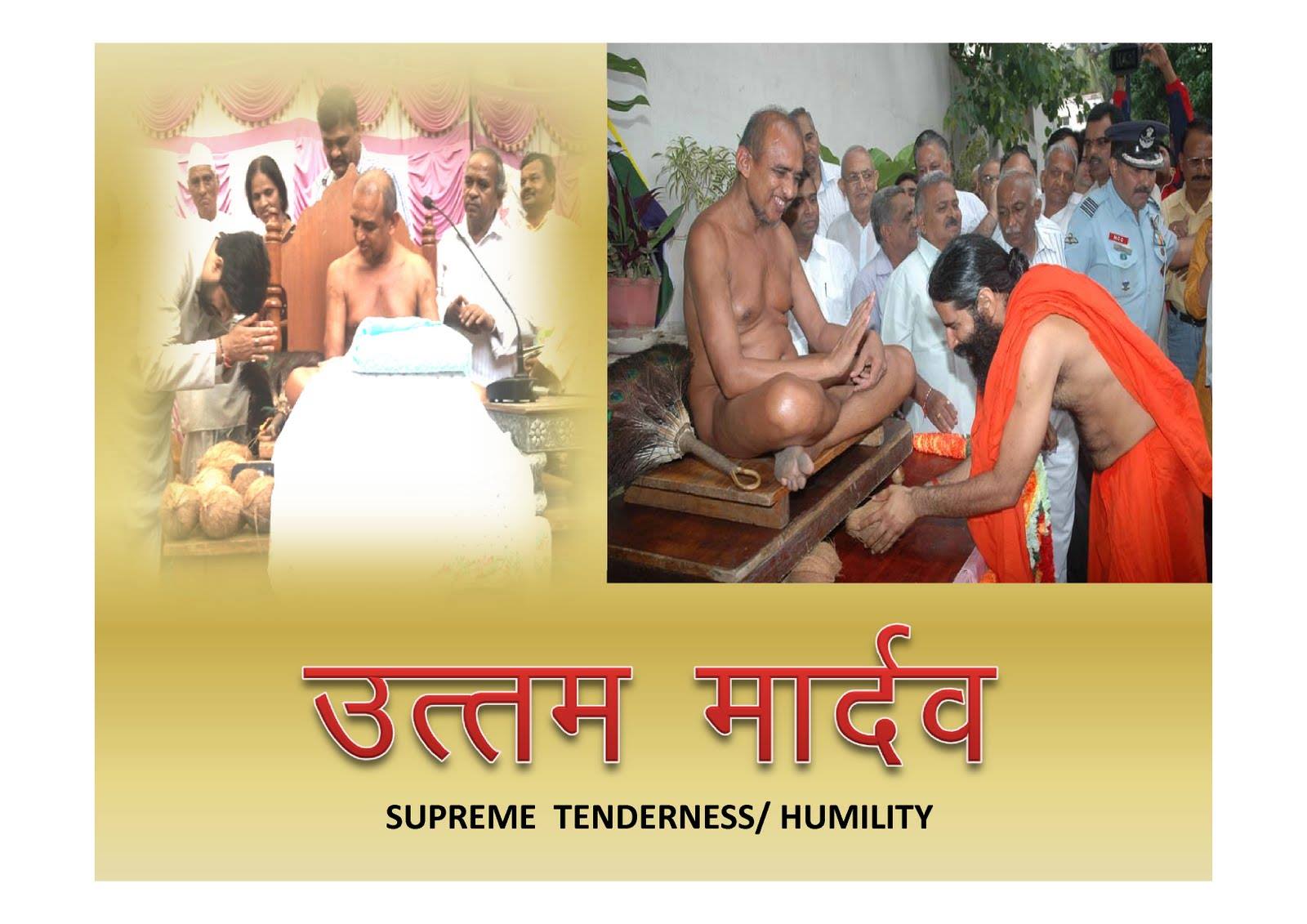 Source: © Facebook
Source: © Facebook
आज "उत्तम मार्दव" - 'मैं हूँ' यह कहने मैं दिक्कत नहीं है, पर 'मैं कुछ हूँ' में परिवर्तित हो जाते हैं तब उसे अहंकार कहते हैं! Explanation by Muni KshamaSagara Ji.
हम सभी अपने जीवन को अच्छा बनाने का निरंतर प्रयत्न करते हैं. कुछ चीज़ें हमारे अज्ञान की वजह से हमारे जीवन में इतना घुल-मिल जाती हैं. जैसे की क्रोध - जो न हम अपने जीवन में चाहते हैं, न ही दुसरे को ऐसा देखना चाहते हैं. बस ऐसे ही चीज़ों का आभाव कैसे कर सकते हैं, यही हमें सीखना है पर्युषण पर्व में.
म्रदोर्भावो मार्दव: हमारे भीतर जो मृदुता है वही मार्दव धर्म है. जिन क्षणों में हम अपने भीतर कोमलता का अनुभव करते हैं, मृदुता का अनुभव करते हैं वे क्षण ही हमारे मार्दव धर्म के हैं.
" अहं करोति इति अहंकारं "अर्थात " मैं करता हूँ " यह जो भाव है यही अहंकार का भाव है. जब हमारी भावनाएं " मैं हूँ " (मेरा अस्तित्व) से " मैं कुछ हूँ " में परिवर्तित हो जाते हैं तब उसे अहंकार कहते हैं. हम जीवन में कभी कभी ऐसा अनुभव करते हैं कि हम चलाते हैं, देश चलते हैं एवं देश - दुनिया का स्वामित्व हमें मिल गया है. जब ऐसी भावना आती है तो उसी को अहंकार कहते हैं.
अहंकार आने से हमारी मृदुता चली जाती है और हम कठोर हो जाते हैं. और ऐसी जो कठोरता मन में आ जाती है वह हमें भी कष्टकारी होती है और दूसरों को भी. इस बात को अगर हम निरंतर ध्यान रखें और चरितार्थ करें तो ये मार्दव धर्म की बात करना सार्थक हो जायेगा.
जब दुसरे का तिरस्कार करने का भाव, दुसरे के गुणों को सहन न करने का भाव, या दूसरो से इर्ष्या करने का भाव आये - तो समझना यही अंहकार है. और ऐसे ही अंहकार के अभाव का दिन है उत्तम-मार्दव. हमारे अन्दर दूसरो के गुणों को देखके हे ईर्ष्या के भाव आना ही अहेंकार को जनम देता है.अक्सर ऐसा लगता है की मान श्रेष्ठता की भावना से आता है, पैर ऐसा नहीं है. मान को हीन भावना की वजह डेवेलोप हुआ एगो ही जनम देता है.हम अपनी योग्यता को जान केर उसका सम्मान करेंगे,तोह बहार से सम्मान पाने की या दुसरे का तिरस्कार करने की भावना ही नहीं होगी.
यह हमपे निर्भर करता है की हम किस प्रकार का जीवन जीना चाहते है. हमारे पास दो रास्ते हैं- पहला यह की हम समुद्र में पड़ी एक बूँद की तरह समुद्र में एकमेक होकर रहे या फिर दूसरा यह की हम समुद्र में द्वीप की तरह अपनी सत्ता कायम रखने के लिए सबसे अलग - थलग अकेले खड़े रहे. हमारे साथ सबसे बड़ी मुश्किल यह है की हमें इसकी चिंता नहीं है की कोई हमारा सम्मान करे या न करे,पर इसकी ज़रूर है की हमारे सामने दुसरे का सम्मान न हो जाये.
"दुसरे का हो रहा सम्मान, हमें लगता है जैसे हो रहा हमारा अपमान "
और इसी को तो अहंकार कहते हैं.लेकिन हमारे गुण तभी बढेंगे जब हम दुसरे के गुणों की प्रशंशा में शामिल हो सकेंगे जब दुसरे के गुण सुनके, उसकी प्रशंशा सुनके हमें हर्ष हो, तब समझना की हमारे अंदर मार्दव धर्म की शुरुवात हुई है.
मेरेपन का भाव भी अंहकार को जनम देता है. 'मैं हूँ' यह कहने मैं दिक्कत नहीं है, पर 'मैं कुछ हूँ' यह भाव अपने साथ अनेक व्याधियां लेके आता है. जब 'मैं कुछ हूँ' तो मेरे पास ये होना चाहिए, वह होना चाहिए और इसी तरह हम संसार के प्रपंचों में पड़ते जाते हैं. हमारे पास चीज़ें होने और उन चीज़ों का उपयोग करना बुरी बात नहीं है, लेकिन उन चीज़ों के माध्यम से अपने आप को बड़ा मानना, बड़ा दर्शाना ही हमारी कमजोरी है. जब भी हम कुछ हासिल करें तो अपने जीवन में उसका आनंद लें, इसमें आनंद न मानें की वह दूसरे लोग देखें. आचार्य भगवंतों ने कहा है- क्रोध कषाय हो तो नरक गति मिलती है, मान कषाय के साथ मनुष्य पैदा होता है, मायाचारी को तिर्यंच गति मिलती है, और लोभी को देव पर्याय प्राप्त होती है.
सम्मान तो 'गुणवत्ता' और 'श्रेष्ठता' का होता है. इसीलिए यदि हम अपनी योग्यता और श्रेष्ठता बढाएं तो हम साधारण होकर भी उस असाधारणता को प्राप्त कर सकते हैं.
जो जितना साधारण है, वो उतना ही असाधारण है और जो जितना असाधारण बनने की कोशिश करता है, वह उतना ही साधारण होता है. अगर हम अहंकार के स्थान पर गौरव करने लगें तो हमारा जीवन और सरल हो जायेगा. जैसे हम उस काल में पैदा हुए जो तीर्थंकर का है, हमें जिनवाणी का समागम मिला, मैं तो ज्ञान-स्वभावी जीव तत्त्व हूँ, मुझे रत्नत्रय धर्म की आराधना करने मिल रही है इत्यादि.
अपने अंदर विनय लाने के लिए हम चार उपाय कर सकते हैं-
पहला यह की दूसरों की प्रशंसा करें, दूसरा यह की भगवान् के गुणगान करें, तीसरा यह की हमपे जिनके उपकार हैं, उन्हें हम याद करें और उनके प्रति कृतज्ञता व्यक्त करें; और चौथा यह की दूसरों की गलतियाँ न देखकर धीरे धीरे अपनी गलतियाँ देखने का स्वाभाव बनाएं.
विनय की दृष्टी
एक बार राजा साहब की सवारी जा रही थी, रस्ते में राजा को एक पत्थर आके लगा, सिपाही यहाँ-वहाँ देखने लगे और सबने देखा की एक छोटा सा बालक हाथ में कुछ पत्थर लिए खडा हुआ है. सब अचंभित हो गए. वो बालक और उसके पास में खड़ी हुयी उसकी माँ दोनों डर गए. गलती करने पर भी माँ-बेटे दोनों विनय के साथ खड़े रहे. सैनिक लड़के को राजा के पास ले आये.
राजा ने पूछा - बेटे, तुमने पत्थर फेका था?
बच्चे ने कहा - 'हाँ, मैंने ही फेका था'
राजा ने फिर पुछा - 'क्या मुझे मारने के लिए फेका था?'
बच्चा बोला - 'नहीं आपको मारने के लिए नहीं, मैंने तो इस पेड़ में लगे हुए आम को तोड़ने के लिए फेका था'.
राजा बहुत खुश हुआ उसकी सच्चाई और विनय से और उसको इनाम दिया.
ऐसे ही कोई हमें चोट पहुंचाए, और हम सहज परिणाम रखें तो हम सबको जीवन का अलग ही आनंद आएगा. ऐसे ही हम अपने जीवन को अच्छा बना पाएंगे.
SOURCE - Taken from Maitree Samooh!
Update
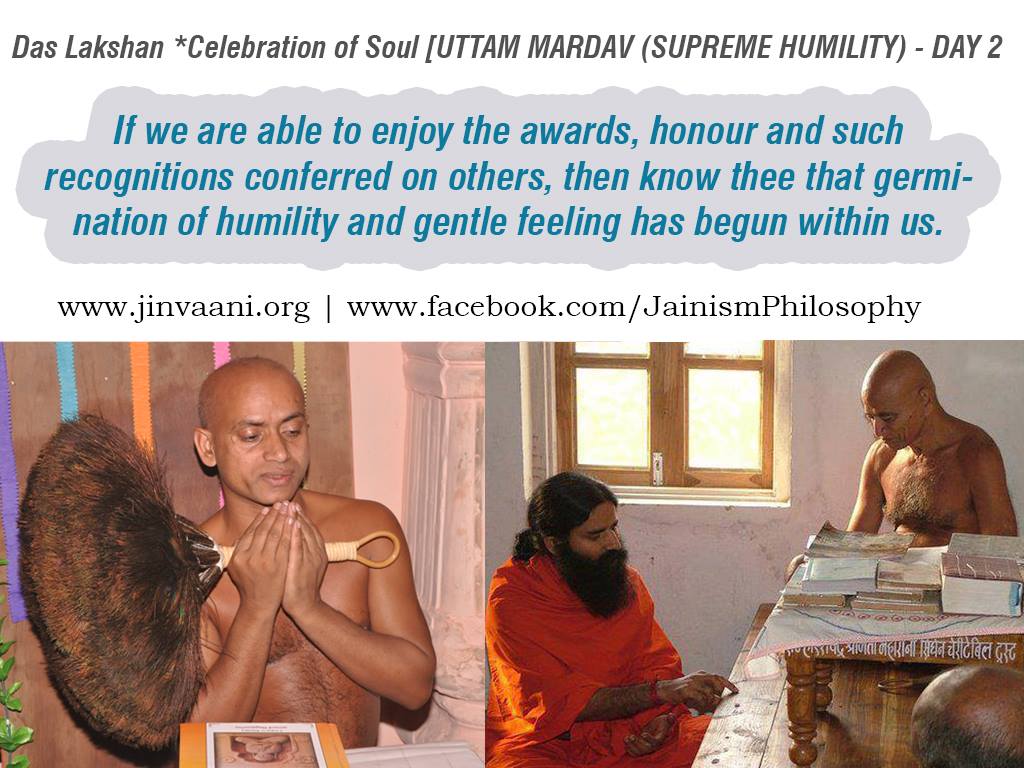 Source: © Facebook
Source: © Facebook
❖ Paryushan/Das Lakshan *Celebration of Soul -UTTAM MARDAV (SUPREME HUMILITY) - DAY 2] ❖ read share gem words..:)
Before you read this, if you try to answer the following questions, you would appreciate this article better, I guess:
1. If some one weaker than you, assaults you by mistake, what will you do in return?
2. Imagine, you are lone rich person in a locality. What would be your feelings about other co-habitants?
3. If your colleague is honoured, what is your first reaction?
4. How much do you think your family is dependent on you and owes you?
5. In success, how much credit do you apportion to your team in your heart of heart?
6. When you acquire a brand new car, what do you expect as your colleagues’ reaction? They should shower praise of your new possession and you should make them feel jealous or otherwise.
UTTAM MARDAV (SUPREME HUMILITY):
- If we are able to enjoy the awards, honour and such recognitions conferred on others, then know thee that germination of humility and gentle feeling has begun within us.
- Make yourself noble and virtuous; recognition would follow itself.
We are discussing ways and means of improving our lifestyle. None of us likes to get angry or feel egoistic or conceal or hoard things and information. These are some habits, which we do not want to continue, however we continue to live with them due to our ignorance.
The gentleness or humility is the virtue or dharma called mardavam. Aham karOti iti ahankAraha i.e I am the doer. This feeling of doership or that I am something is called ego or ahankar. The feeling of I, is not ego. It signifies our existence that is permanent beyond the pales of birth and death. The feelings of doership and ownership (mamakAr) make a man isolated from fellow beings. His/her attitude becomes harsh and hardened unlike the natural feeling of sensitiveness, considerateness and humbleness. He/she starts thinking that he/she rules the entire universe and it belongs to him. I exhibited a while earlier a symptom of harshness. It is a sign of weakness. Now I think that I could have stated the same thing in a different way. I could have said that let us try to perform the puja this way and see whether we enjoy more than what we have been doing. I realize the impact of the weakness and one should redress it then and there. This has given us an opportunity to review each step, feed autosuggestion, handle each step with caution and improve our attitude, our thoughts and our environment. We must always remember that when the feeling of doership starts descending within us, the gentleness in our behavior ceases and this causes suffering to one and all.
AhankAr and Vinay (doership and humility)
The feeling of AhankAr begs for recognition. Since this feeling is so vast that any amount of recognition is never up to its expectation. The diseased (i.e the one inflicted with AhankAr) is never satisfied and at ease. There is a saying that “mAnEna truptamit bhOgEna na”i.e. satisfaction comes from recognition but not enjoyment. In fact, Acharyashri elaborates further that the satisfaction or contentment born out of recognition is due to the feelings of gratitude and humility towards the society which has honored him/her. Since the ahankAri lacks humility, the contentment naturally eludes him/her. Recognition by itself is not a taboo but expectation of it is. Each and every recognition must proliferate the growth of humility within us.
What is the touchstone for ahankAr? How can we know that it has taken roots in us? Whenever the feeling of humiliation, jealousy and intolerance of merit towards others is seen, then surely understand there is ahanKar within us. These are the varieties of passion of false-ego (mAn kshAya) which we need to guard against. Inferiority complex within us by seeing the success of others breeds false-ego. External recognition is secondary to one who trusts in one’s evolution into an able person. This itself is recognition to one. Make yourself noble and virtuous; recognition would follow itself. Once we start cultivating the extraordinary capability to grow then we would accept recognition of others accomplishments as a routine matter and would not ignore their credentials. In fact we would feel elated in others’ success. If we are able to enjoy the awards, honour and such recognitions conferred on others, then know thee that germination of humility and gentle feeling has begun within us.
We have two options: to think oneself as doer and owner of the entire world or to think a part of the macrocosm. We can be like an island or a drop in the ocean. Being a part of the macrocosm shows the way to humility. One who lacks this intrinsic strength to grow gives way to false-ego. An egoist abhors recognition to others more than enjoys his/her own. In fact, (s)he feels dishonored in their honor. Our nobility starts expanding only when we look out for merit, recognize and eulogise it.
We have complicated our lifestyle so much that we have become highly dependent on external things to satisfy our ahankAr. Imagine for a moment that I am an officer and I entertain this false-ego of this post. Then I expect to treat my subordinates lowly but they in turn must tow my line etc. Then I need external paraphernalia such as servants, vehicles, bungalow and such comforts to assuage my feeling and public image of an officer. So overnight, I became weak because I depend on things other than me to feel like an ‘officer’. One must guard against seepage of ahankar at these moments of public responsibility.
Exhibition of False-ego
To have resources of comforts is not bad. Proper utilization of them also is not bad. But to use them as exhibits of your false-ego is a sign one’s weakness. To show off one’s car or money, bungalow etc. is surely a symptom of ahankAr. Ahankar or false-ego is a sub-class of four varieties of passions viz. anger, false-ego, conceit and greediness. One leads to another. These are the driving force of mundane activities. Acharya bhagvant says “ A being inflicted with greediness can reach heaven; one with conceit is doomed to animal life; one with anger to hellish and one with false-ego to humanly living”. The intensity of these passions would decide the status of the life in each category.
Let us not underestimate the power of false-ego. Even an infant has enough of it. Just ignore him/her for a moment. (S)he shrieks to draw our attention. So we have been carrying the false-ego right from our birth and so it needs our priority. I cite two examples of show-off which is a common ailment within us.
There was a king who wanted to show his prowess and wealth to a saint. He invited him and showed them one after another with great boast. The king showed the feat of boat he had. The saint replied that he could see only a couple. The king was taken aback and said, “ Have your eyesight become weak? Shall I get it treated?” The saint replied that he could see only two of them - one was his hunger for name and the other for fame and nothing more. The saint need neither of them.
Another is the story of a woman who had a beautiful pAn-dAn (a container for betel leaves, betel nut etc). She wanted to show off to her neighbours. Unfortunately however much she tried, none noticed it. She got so frustrated, she created an extraordinary scene in her house. She started a fire in her house and shouted for help hoping all would assemble. A few Samaritans went for extinguish the fire. An old woman joined for consoling her. At that moment, this woman took out pAn (betel leaves etc) from the pAn-dAn. The old woman exclaimed ‘ what a beautiful pAn-dAn? When did you buy it?” The woman said “ kaash, have you queried a long time back, the fire scene need not be enacted”. So much hunger and thirst for showing off!
Difference between false-ego (mAn) and recognition (sammAn)
Humility gets recognized itself at every walk of life. You don’t have to work for it. On the other hand, to expect recognition from others is loaded with risks. You have changed your priority from growing within to recognition from others. The recognition doesn’t come easily. You have to work for it. You may be ignored many a times. All the times, you are worried over its outcome and you become weak internally. This means your independence and receptivity get jaded. So mAn though begs of sammAn all the time, it never really gets commensurate to its expectations and the egoist is always wavered.
Jealousy overlooks virtues
Let me explain this with an example. You come up with two suggestions. I feel jealous and so I ignore them. On the other hand, I accept them and offer you two more. So we have more options to carry out a task. We are richer with options and this attitude helps in bridging our understanding and mutual appreciation. We become more receptive to new ideas once we are free of jealousy.
Replace False-ego with Greatness
We should make small adjustments in our attitudes. For instance we can feel very egoistic that we belong to the clan of Tirthankar or feel proud of this fact and try to be worthy of this great opportunity. We should not look down others on this difference.We should introspect that we have done some good deeds to be born in this great clan and expand this opportunity further by proper bhavana rather than wasting time and golden opportunity in belittling others. Once we start practicing such attitude, the external beauty would also grow into internal one as well proclaiming (the gospel of Acharya Kund Kund in Samayasar) “savvattha sundaro loye”. It is stated here that the true nature of soul or Self in sum substance is the beauty par excellence and other combinations are artifacts. The external appearance is the manifestation of internal thinking or attitude. Even I am ugly, my positive thought would overcome this impediment and vice-versa. So we have some talent like right knowledge, let us be proud of it and share with others rather than being myopic in view.
A knowledgeable has two options: to dispel ignorance of oneself and others or to denigrate others’ ignorance with this unique possession. The same option holds good for a wealthy individual. He must make use of floating wealth in proper utilization before the expiry date. Our attitude to these possessions can make or mar our life-graph. If I feel intoxicated and egoistic, it would spell doom and on the other hand, I make good use of it, I can evolve higher and higher. It should remind us of the greatest of our virtues namely ananta chatushtaya = the infinite-quartet (infinite perception, knowledge, capacity and bliss) and our duty thereof.
The highest race in the universe is that of Tirthankar and if we believe, we belong to it, we must behave worthy of that claim. The infinite knowledge is the real asset and the knowledge borne out of partial destruction cum subsidence is insignificant in comparison. We must always remember this truth and dispel even traces of false-ego. We must refill with humility and gentleness instead step-by-step, moment-by-moment and day-by-day.
Eulogy of merit is honouring the self
How to acquire humility? Very simple! First, just start appreciating true merit in others, not by showing off but with true intent. Start praising others’ true worth by your thoughts, words and gestures. There are two advantages: 1. You are filling with positive vibes within you and 2. Negate time and room for negative thoughts.
Second, praise and pray God (“vande tat guna labhdaye”). This is he best way to ward off false-ego and fill in with humility and gentleness.
Expression of gratitude is sign of humility
Third, recollect with gratitude the good things extended to you by others. Remember day to day basis and life-time basis. In this world every act is dependent on others. Take for instance, you are doing puja but some one has made arrangements for your seat, utilities etc. Then this thought of gratitude reduces our false-ego claiming sole authorship. Let us think this way “ how many people or beings contribute to my life, my very existence rather than entertaining false ego of “ I am responsible for others’ survival etc”.
Lastly, try to spot your weakness rather than finding fault in others. This way, you would have less time and opportunity to fell egoistic. To err is human but to accept errors is divine. Don’t delay in acknowledging our errors as delay means denial.
Humility does not co-reside with thoughts of false-ego that I am extra-ordinary and great etc.
We need to perfect humility in all dimensions of our life.
Vinay has to be in speech -sweet words
Vinay in mind through supreme thoughts
Vinay in body by good deeds
Every one of us knows what are sweet words, great thoughts and good deeds. Once we start practicing them in our daily life, we would acquire the virtue of supreme humility, gentleness and sensitivity very easily.
Outlook of humility
Once a king was on a horse-ride through a village side. There were mango trees on either side of the road through which the royal pagan was passing by. A stone hit the king. The soldiers caught hold of the assaulter, a young boy. Her mother who was by his side feared his end. Who could get away from such temerity? The king enquired the boy as to why he hit him. The boy explained that his target was the mango tree laden with sweet and delicious fruits and by mistake it misfired and prayed that he be suitably punished for his mistake. The king was highly impressed with his frankness, boldness and above all humility. He offered him his precious necklace. Every one was surprised by the turn of events. The king explained “ if a tree can reward him with delicious fruit on pelting of stones, can I be cruel and unkind to him? Can I not learn from nature and become noble?”
This is the right way of reaction against adversity. If we can take the event in right spirit, humility and goodwill will overflow. We must try to experience this way in our life once in a while and reap the benefits of humility.
Article Source: These preaching's by Ascetic Kshamasagara G, efforts to translate into English by Maitree Samooh.
--- website: ♫ www.jinvaani.org @ Jainism' e-Storehouse ---
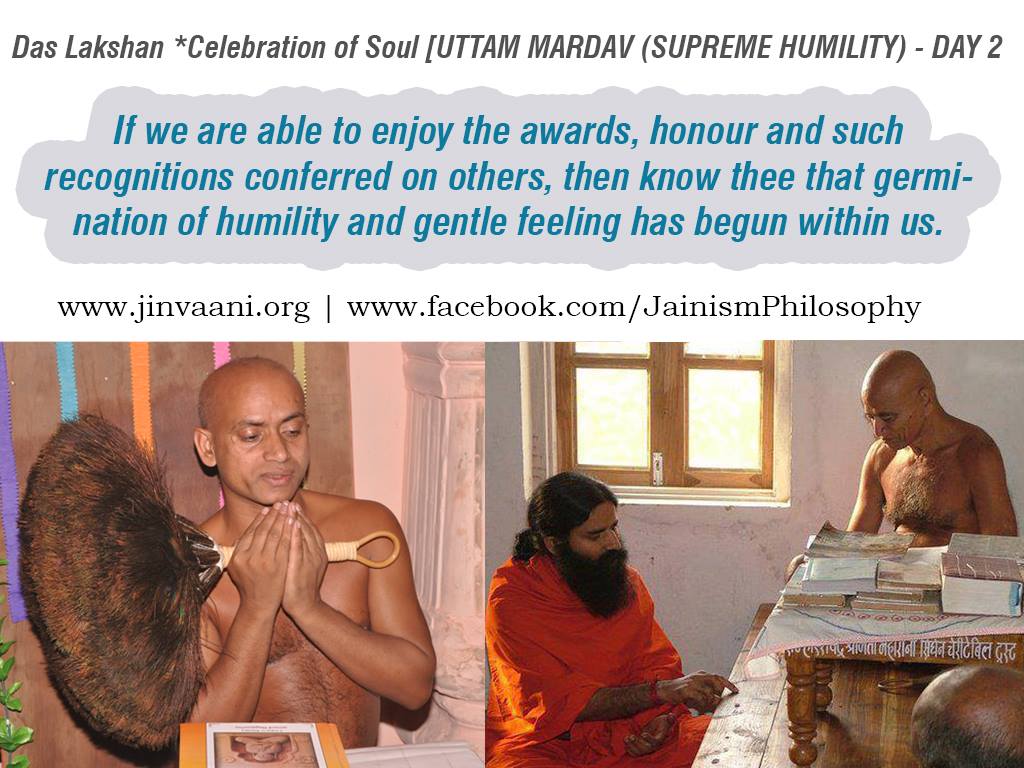 Source: © Facebook
Source: © Facebook
1. If some one weaker than you, assaults you by mistake, what will you do in return?
2. Imagine, you are lone rich person in a locality. What would be your feelings about other co-habitants?
3. If your colleague is honoured, what is your first reaction?
4. How much do you think your family is dependent on you and owes you?
5. In success, how much credit do you apportion to your team in your heart of heart?
6. When you acquire a brand new car, what do you expect as your colleagues’ reaction? They should shower praise of your new possession and you should make them feel jealous or otherwise.
GET ALL ANSWERS HERE HAVE READ OF FOLLOWING ARTICLE... @ Jainism -the Philosophy!!!
News in Hindi
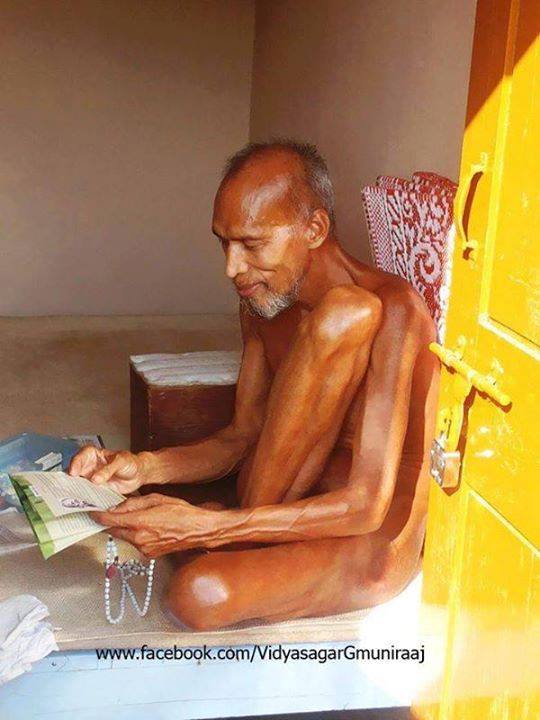 Source: © Facebook
Source: © Facebook
आज "उत्तम मार्दव" - 'मैं हूँ' यह कहने मैं दिक्कत नहीं है, पर 'मैं कुछ हूँ' में परिवर्तित हो जाते हैं तब उसे अहंकार कहते हैं! Explanation by Muni KshamaSagara Ji.
हम सभी अपने जीवन को अच्छा बनाने का निरंतर प्रयत्न करते हैं. कुछ चीज़ें हमारे अज्ञान की वजह से हमारे जीवन में इतना घुल-मिल जाती हैं. जैसे की क्रोध - जो न हम अपने जीवन में चाहते हैं, न ही दुसरे को ऐसा देखना चाहते हैं. बस ऐसे ही चीज़ों का आभाव कैसे कर सकते हैं, यही हमें सीखना है पर्युषण पर्व में.
म्रदोर्भावो मार्दव: हमारे भीतर जो मृदुता है वही मार्दव धर्म है. जिन क्षणों में हम अपने भीतर कोमलता का अनुभव करते हैं, मृदुता का अनुभव करते हैं वे क्षण ही हमारे मार्दव धर्म के हैं.
" अहं करोति इति अहंकारं "अर्थात " मैं करता हूँ " यह जो भाव है यही अहंकार का भाव है. जब हमारी भावनाएं " मैं हूँ " (मेरा अस्तित्व) से " मैं कुछ हूँ " में परिवर्तित हो जाते हैं तब उसे अहंकार कहते हैं. हम जीवन में कभी कभी ऐसा अनुभव करते हैं कि हम चलाते हैं, देश चलते हैं एवं देश - दुनिया का स्वामित्व हमें मिल गया है. जब ऐसी भावना आती है तो उसी को अहंकार कहते हैं.
अहंकार आने से हमारी मृदुता चली जाती है और हम कठोर हो जाते हैं. और ऐसी जो कठोरता मन में आ जाती है वह हमें भी कष्टकारी होती है और दूसरों को भी. इस बात को अगर हम निरंतर ध्यान रखें और चरितार्थ करें तो ये मार्दव धर्म की बात करना सार्थक हो जायेगा.
जब दुसरे का तिरस्कार करने का भाव, दुसरे के गुणों को सहन न करने का भाव, या दूसरो से इर्ष्या करने का भाव आये - तो समझना यही अंहकार है. और ऐसे ही अंहकार के अभाव का दिन है उत्तम-मार्दव. हमारे अन्दर दूसरो के गुणों को देखके हे ईर्ष्या के भाव आना ही अहेंकार को जनम देता है.अक्सर ऐसा लगता है की मान श्रेष्ठता की भावना से आता है, पैर ऐसा नहीं है. मान को हीन भावना की वजह डेवेलोप हुआ एगो ही जनम देता है.हम अपनी योग्यता को जान केर उसका सम्मान करेंगे,तोह बहार से सम्मान पाने की या दुसरे का तिरस्कार करने की भावना ही नहीं होगी.
यह हमपे निर्भर करता है की हम किस प्रकार का जीवन जीना चाहते है. हमारे पास दो रास्ते हैं- पहला यह की हम समुद्र में पड़ी एक बूँद की तरह समुद्र में एकमेक होकर रहे या फिर दूसरा यह की हम समुद्र में द्वीप की तरह अपनी सत्ता कायम रखने के लिए सबसे अलग - थलग अकेले खड़े रहे. हमारे साथ सबसे बड़ी मुश्किल यह है की हमें इसकी चिंता नहीं है की कोई हमारा सम्मान करे या न करे,पर इसकी ज़रूर है की हमारे सामने दुसरे का सम्मान न हो जाये.
"दुसरे का हो रहा सम्मान, हमें लगता है जैसे हो रहा हमारा अपमान "
और इसी को तो अहंकार कहते हैं.लेकिन हमारे गुण तभी बढेंगे जब हम दुसरे के गुणों की प्रशंशा में शामिल हो सकेंगे जब दुसरे के गुण सुनके, उसकी प्रशंशा सुनके हमें हर्ष हो, तब समझना की हमारे अंदर मार्दव धर्म की शुरुवात हुई है.
मेरेपन का भाव भी अंहकार को जनम देता है. 'मैं हूँ' यह कहने मैं दिक्कत नहीं है, पर 'मैं कुछ हूँ' यह भाव अपने साथ अनेक व्याधियां लेके आता है. जब 'मैं कुछ हूँ' तो मेरे पास ये होना चाहिए, वह होना चाहिए और इसी तरह हम संसार के प्रपंचों में पड़ते जाते हैं. हमारे पास चीज़ें होने और उन चीज़ों का उपयोग करना बुरी बात नहीं है, लेकिन उन चीज़ों के माध्यम से अपने आप को बड़ा मानना, बड़ा दर्शाना ही हमारी कमजोरी है. जब भी हम कुछ हासिल करें तो अपने जीवन में उसका आनंद लें, इसमें आनंद न मानें की वह दूसरे लोग देखें. आचार्य भगवंतों ने कहा है- क्रोध कषाय हो तो नरक गति मिलती है, मान कषाय के साथ मनुष्य पैदा होता है, मायाचारी को तिर्यंच गति मिलती है, और लोभी को देव पर्याय प्राप्त होती है.
सम्मान तो 'गुणवत्ता' और 'श्रेष्ठता' का होता है. इसीलिए यदि हम अपनी योग्यता और श्रेष्ठता बढाएं तो हम साधारण होकर भी उस असाधारणता को प्राप्त कर सकते हैं.
जो जितना साधारण है, वो उतना ही असाधारण है और जो जितना असाधारण बनने की कोशिश करता है, वह उतना ही साधारण होता है. अगर हम अहंकार के स्थान पर गौरव करने लगें तो हमारा जीवन और सरल हो जायेगा. जैसे हम उस काल में पैदा हुए जो तीर्थंकर का है, हमें जिनवाणी का समागम मिला, मैं तो ज्ञान-स्वभावी जीव तत्त्व हूँ, मुझे रत्नत्रय धर्म की आराधना करने मिल रही है इत्यादि.
अपने अंदर विनय लाने के लिए हम चार उपाय कर सकते हैं-
पहला यह की दूसरों की प्रशंसा करें, दूसरा यह की भगवान् के गुणगान करें, तीसरा यह की हमपे जिनके उपकार हैं, उन्हें हम याद करें और उनके प्रति कृतज्ञता व्यक्त करें; और चौथा यह की दूसरों की गलतियाँ न देखकर धीरे धीरे अपनी गलतियाँ देखने का स्वाभाव बनाएं.
विनय की दृष्टी
एक बार राजा साहब की सवारी जा रही थी, रस्ते में राजा को एक पत्थर आके लगा, सिपाही यहाँ-वहाँ देखने लगे और सबने देखा की एक छोटा सा बालक हाथ में कुछ पत्थर लिए खडा हुआ है. सब अचंभित हो गए. वो बालक और उसके पास में खड़ी हुयी उसकी माँ दोनों डर गए. गलती करने पर भी माँ-बेटे दोनों विनय के साथ खड़े रहे. सैनिक लड़के को राजा के पास ले आये.
राजा ने पूछा - बेटे, तुमने पत्थर फेका था?
बच्चे ने कहा - 'हाँ, मैंने ही फेका था'
राजा ने फिर पुछा - 'क्या मुझे मारने के लिए फेका था?'
बच्चा बोला - 'नहीं आपको मारने के लिए नहीं, मैंने तो इस पेड़ में लगे हुए आम को तोड़ने के लिए फेका था'.
राजा बहुत खुश हुआ उसकी सच्चाई और विनय से और उसको इनाम दिया.
ऐसे ही कोई हमें चोट पहुंचाए, और हम सहज परिणाम रखें तो हम सबको जीवन का अलग ही आनंद आएगा. ऐसे ही हम अपने जीवन को अच्छा बना पाएंगे.
SOURCE - Taken from Maitree Samooh!
Update
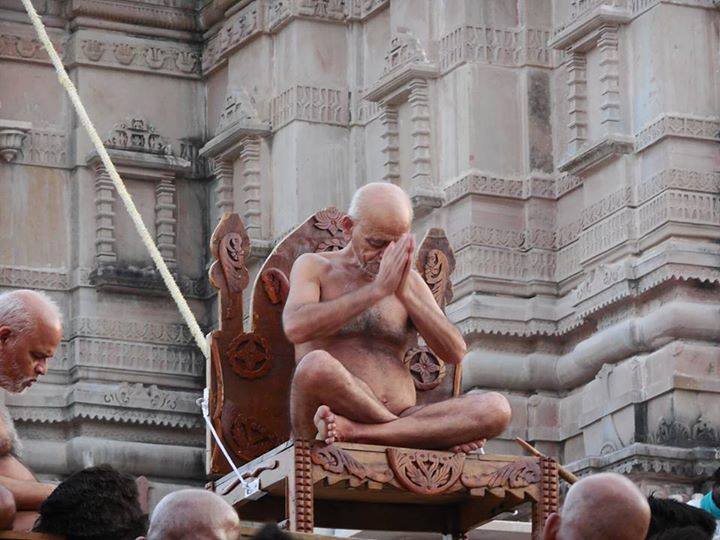
❖ दस लक्षण धर्म उर धारो, तो भव जल तर जाओगे! ❖
धर्म निभालो, पुण्य कमालो, यह भव, पर भव सफल बनालो!!
वही पाओगे जमा जो, यहाँ कर जाओगे..दस लक्षण धर्म उर धारो, तो भव जल तर जाओगे...
उत्तम क्षमा शांति मन लावे, सबको जलाने वाले क्रोध को जलावे!
मार्दव झुटा मान मिटावे, आर्जव कपट कपाट हटावे!!
इन्हें पालोगे तो पार उतर जाओगे, दस लक्षण धर्म उर धारो, तो भव जल तर जाओगे...
सतवादी नर कही न हारा, संत का पंथ सता उजियारा!
शोच से जीवन निर्मल कीजे, तन मन मंदिर सम कर लीजे!!
तप तपने से सोने से निखर जाओगे...दस लक्षण धर्म उर धारो, तो भव जल तर जाओगे...
करते है त्याग, बड़े मन वाले, संयम डिगते चरण संभाले!
ना कोई तेरा, ना मैं किसी का, धर्म अकिंचन नाम इसी का!!
ब्रम्हचारी बनके तेज से भर जाओगे....दस लक्षण धर्म उर धारो, तो भव जल तर जाओगे...
यह दस सीढ़ी मोक्ष महल की, वृद्धि करे जो आर्जव मन की!
हर आत्मा में प्रभु रमता है, प्रभु बनने की सबमे क्षमता है!!
झूटे धर छुटेंगे साचे घर जाओगे...दस लक्षण धर्म उर धारो, तो भव जल तर जाओगे...
SOURCE - ये भजन रविन्द्र जैन का लिखा और उनका ही गाया हुआ है!!
--- website: ♫ www.jinvaani.org @ Jainism' e-Storehouse ---
